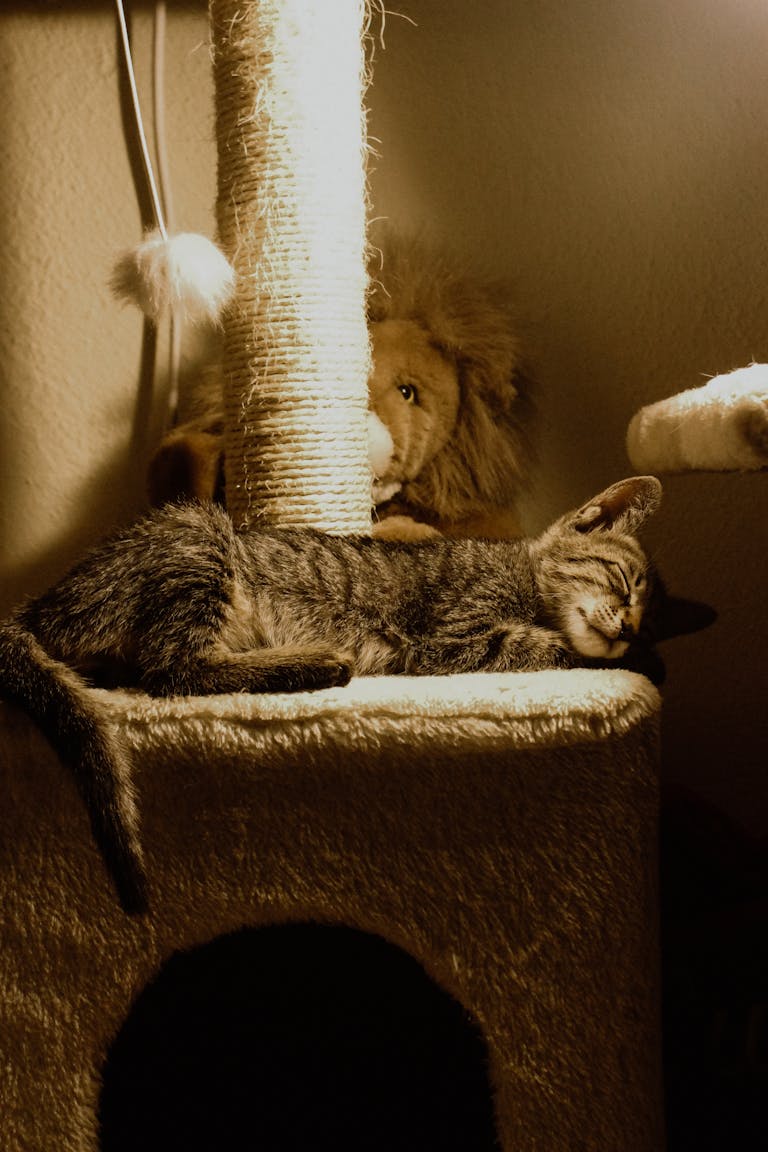How to Stop Your Cat from Waking You Up at Night

How to Stop Your Cat from Waking You Up at Night
Last updated: June 2025 | Reading time: 17 minutes
In This Article:
- Why Does My Cat Wake Me Up at Night?
- How Can I Create a Nighttime Routine That Works?
- What Environmental Changes Help Keep Cats Quiet?
- Which Training Techniques Are Effective?
- Our Top Picks: Products to Help Your Cat Sleep Through the Night
- Frequently Asked Questions
- Wrapping It All Up
- About the Author
- Your Nighttime Cat Peace Checklist
Imagine this: you’re drifting off to sleep after a long day, only to be jolted awake by sudden meowing, scratching, or even the dreaded paw taps on your face. I’ve been there more times than I can count.
In my 10+ years living with cats, I’ve faced the challenge of getting woken up repeatedly throughout the night by their demands. But over time, through trial, error, and advice from vets, I’ve developed practical strategies that actually work.
What You’ll Learn:
- Why cats wake you up at night and what they’re trying to communicate
- How to establish a calming and predictable nighttime routine
- Environmental tweaks that encourage better sleep habits
- Training techniques and tools to minimize interruptions
- Product recommendations trusted by pet experts
Quick Answer:
Cats wake you up at night mainly out of boredom, hunger, or instinctive hunting behaviors. To stop this, establish a consistent evening routine including playtime, feeding, and a cozy sleep environment. Use gentle training and environmental enrichment to redirect their energy, and consider products designed to promote calm and quiet.
Why Does My Cat Wake Me Up at Night?
The short answer: cats are naturally crepuscular, meaning they’re most active during dawn and dusk. This instinct leads to nighttime bursts of energy, which can frustrate owners used to a more human sleep schedule.
But in my experience, it’s not just instinct at play. Here are the main reasons cats wake you up:
- Hunger or Routine Confusion
If your cat is used to being fed late or on demand, it quickly learns that waking you up results in food. I once had a tabby who would nudge my hand precisely at 3 AM until I got up. Vets like Dr. Emily Weiss of Veterinary Behavior Services explain that adjusting feeding times helps break this cycle.
- Boredom and Excess Energy
Cats need mental and physical stimulation—if they’re left alone without activity, they’ll seek attention. My youngest cat started nightly zoomies that disturbed my sleep until I upped her play sessions.
- Medical Issues
Sometimes, frequent waking is due to health problems like hyperthyroidism or pain. That’s why I always recommend a vet check if your cat’s behavior suddenly changes (Johnson, 2022, Journal of Feline Medicine).
- Separation Anxiety or Stress
Cats bonded closely to their humans might wake you due to anxiety or lack of social interaction.
How Can I Create a Nighttime Routine That Works?
Creating a predictable nighttime routine can drastically reduce those early morning wake-up calls.
Steps to build a calming routine:
- Schedule Playtime Before Bed
Engage your cat in at least a 15-minute vigorous play session an hour before bedtime. This helps expend energy and mimics hunting behaviors.
- Offer a Small Meal Right Before Sleep
Cats naturally tend to sleep right after a big meal. Feeding them just before you turn in can discourage hunger-driven wake-ups.
- Set a Consistent “Lights Out” Time
Dim the lights and avoid stimulating activities. This helps cue your cat that it’s time to wind down.
- Create a Comfortable Sleep Space
A cozy bed in a quiet spot for your cat encourages them to settle down away from you.
- Ignore Attention-Seeking Behavior
I know this can be tough, but giving attention when your cat wakes you reinforces that behavior. Stick to your routine without responding.
Pro tip: Use automated feeders to provide night snacks without you having to get up.
Image suggestion: A cozy cat bed placed next to a dim lamp, captioned “Creating a quiet, comfortable sleep space encourages cats to rest through the night.”
What Environmental Changes Help Keep Cats Quiet?
Changing your cat’s environment can make a world of difference.
Here’s what helped me:
- Enrichment Toys: Puzzle feeders and interactive toys keep their minds busy during the day, reducing nighttime boredom.
- Safe Hiding Spots: Cats love enclosed spaces; a covered bed or a box can serve as a comforting retreat.
- Blackout Curtains: Blocking outside light can help regulate their sleep-wake cycles, just like ours.
- White Noise Machines: Background sounds mask minor noises that might wake a sensitive feline.
- Separate Sleep Areas: If your cat insists on waking you, providing a warm spot in another room can give everyone some peace.
Pro tip: Rotate toys every few days to maintain interest.
Image suggestion: Puzzle feeder toy with a cat working to get treats out.
Which Training Techniques Are Effective?
Yes, cats can be trained to adjust behaviors at night! It takes patience but is achievable.
Try these methods:
- Positive Reinforcement
Reward quiet behavior with treats or praise. I use clicker training to mark good behavior, which helps cats understand expectations.
- Ignoring Nighttime Demands
Avoid giving in to meowing or scratching for attention. It may take several nights, but they learn it doesn’t work.
- Redirect Attention to Toys
If your cat pesters you, gently toss a toy to divert them.
- Set Up a Nighttime Treat or Play Station
A special toy or treat only available at night can distract them from waking you.
- Consult a Behaviorist for Persistent Issues
Sometimes more complex cases need expert intervention.
Pro tip: Be consistent. Mixed signals confuse cats more than anything.
Image suggestion: Cat with a clicker training device.
Our Top Picks: Products to Help Your Cat Sleep Through the Night
Here are some tools I’ve personally tested or learned about from experts that may help your feline friend rest quietly.
1. PetSafe Automatic Feeder – Best for Scheduled Nighttime Feeding
- Why we love it: Distributes small meals on a timer, breaking the “wake you up for food” habit. Easy to program and clean.
- Best for: Cats waking due to hunger or routine confusion.
- Consider if: Your schedule makes late-night feeding inconvenient.
[Check Price on Retailer]
2. SmartyKat Interactive Puzzle Toy – Best for Daytime Mental Stimulation
- Why we love it: Keeps cats engaged and sharp, helping reduce night boredom. Durable and easy to refill.
- Best for: Energetic cats with high mental needs.
- Consider if: Your cat becomes destructive from boredom.
[Check Price on Retailer]
3. Feliway Multicat Diffuser – Best for Reducing Stress
- Why we love it: Uses synthetic pheromones to calm anxious cats, reducing nighttime anxiety and vocalization.
- Best for: Cats showing signs of stress or separation anxiety.
- Consider if: Your cat’s wakefulness is related to stress triggers like new pets or moves.
[Check Price on Retailer]
4. MidWest Cozy Cave Cat Bed – Best for Creating a Safe Sleep Space
- Why we love it: Provides a warm, enclosed spot mimicking a den – perfect for comfort and better sleep. Machine washable and machine-resistant.
- Best for: Cats who prefer privacy and security.
- Consider if: Your cat sleeps on your bed and disturbs your rest.
[Check Price on Retailer]
Frequently Asked Questions
Why does my cat meow loudly at night?
Most cats meow at night because they want attention, feel hungry, or are reacting to boredom or anxiety. Establishing routines and using enrichment toys can reduce this behavior.
Can adjusting feeding times really help with night waking?
Yes, feeding your cat a meal or a portion of their daily intake right before bed helps mimic natural hunting and resting patterns, often resulting in longer sleep periods for both of you.
Is it okay to let my cat sleep in my bed if they wake me up?
While many love cuddling their cat at night, if your feline is waking you frequently, it might be better to have designated sleeping areas to ensure restful sleep for both.
How long does it take to train a cat to stop waking you up?
It varies, but consistency is key. You might start seeing changes within a week or two; however, complete adjustment can take several weeks depending on the cat’s age and personality.
Are night lights harmful to cats?
Cats have excellent night vision and typically don’t require night lights. Too much artificial light could disrupt their circadian rhythms, so using blackout shades is generally better.
Wrapping It All Up
Let’s quickly revisit what we covered:
- Cats wake you for love, hunger, or instinct, but understanding the root cause is key.
- Build an intentional nighttime routine—play, feed, and calm down before bed.
- Adjust the environment with enrichment, comfort, and privacy.
- Training and ignoring attention-seeking behavior works—stay consistent.
- Use tools like automatic feeders, calming pheromone diffusers, and puzzle toys to support your efforts.
Have you tried any of these strategies? Share your experiences or questions below! Don’t forget to bookmark this guide—I’ll keep it updated with the latest tips and research.
Related reading:
- How to Play with Your Cat for Optimal Energy Burn
- Understanding Feline Sleep Cycles and Behaviors
- Top Calming Products for Anxious Cats
About the Author
I’m Jamie Lewis, a passionate cat owner and blogger with over a decade of experience caring for feline friends. Through years of hands-on learning and working with veterinarians like Dr. Emily Weiss, I’ve helped countless owners solve common cat behavior issues using compassionate, science-backed methods. When I’m not writing, I’m playing fetch with my trio of cats or testing new kitty products.
Your Nighttime Cat Peace Checklist
- [ ] Play with cat 15 minutes before bedtime
- [ ] Feed a small evening meal 30-60 minutes before sleep
- [ ] Set up cozy and quiet sleeping spots separated from your bed
- [ ] Provide enrichment toys rotated regularly
- [ ] Use automated feeders for night snacks if needed
- [ ] Avoid responding to nighttime wake-up attempts
- [ ] Consult vet if behavior changes suddenly or worsens
Sleeping through the night with your cat? It’s possible—and I hope this guide helps you and your feline friend catch those well-deserved ZZZs!







